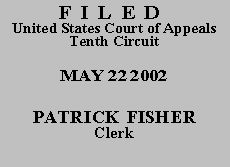

| UNITED STATES OF AMERICA,
Respondent - Appellee, v. MIGUEL NAVARRETE-CARRILLO, Petitioner - Appellant. |
97-CR-106-B)
|
Federal prisoner Miguel Navarrete-Carrillo, proceeding pro se, seeks to appeal from the denial of his 28 U.S.C. § 2255 motion to vacate his sentence. Mr. Navarrete-Carrillo pleaded guilty on January 30, 1998, to one count of conspiring to possess with intent to distribute methamphetamine, in violation of 21 U.S.C. § 846. He was sentenced to serve seventy-seven months in prison and did not appeal from his conviction.
Over two years later, on February 16, 2001, Mr. Navarrete-Carrillo filed a
§ 2255 motion, contending for the first time that his plea was involuntary and he would not have pleaded guilty if counsel had advised him that the government's evidence was invalidly obtained by use of a wiretap or that under Apprendi v. New Jersey, 530 U.S. 466 (2000), "quantity under 21 U.S.C. § 841 would have to be proven beyond a reasonable doubt." R. Vol. 1, Doc. 1 at 5. The district court denied his § 2255 motion as untimely filed. See § 2255(1) (providing that one-year period of limitation generally runs from the date the judgment of conviction becomes final). The court also noted that "[n]either the Supreme Court nor the Tenth Circuit . . . has applied Apprendi retroactively," R. Vol. 1, Doc. 7 at 2, foreclosing any tolling of the statute of limitations. See § 2255(3) (providing tolling of one-year statute of limitation when the right asserted was newly recognized by the Supreme Court after appellant's conviction and made retroactively applicable to cases on collateral review).
Mr. Navarrete-Carrillo must obtain a certificate of appealability (COA) by making a "substantial showing of the denial of a constitutional right." 28 U.S.C.
§ 2253(c)(2). When, as here, the district court has dismissed the case on procedural grounds without considering the underlying constitutional claim, the appellant must demonstrate that "jurists of reason would find it debatable
whether the petition states a valid claim of the denial of a constitutional right and that jurists of reason would find it debatable whether the district court was correct in its procedural ruling." Slack v. McDaniel, 529 U.S. 473, 484 (2000).
Mr. Navarrete-Carrillo does not argue for a tolling of the limitations period, and we have no reason to question the district court's holding that his § 2255 motion was barred by the applicable statute of limitations. Therefore, we conclude that jurists of reason would not "find it debatable whether the district court was correct in its procedural ruling." Id.
Further, if we were to reach the merits, the record demonstrates that Mr. Navarrete-Carrillo's decision to plead guilty was based on the fact that his co-conspirator "decided to plead [guilty] on that last day [before trial] and turned State's evidence on [him]," and not on any alleged wiretap evidence the government had obtained. Aplt. Br., App. A at 7 (Tr. of Sentencing Hr'g). In addition, the indictment alleged that Mr. Navarrete-Carrillo "possessed with intent to distribute and/or distributed at least six ounces of methamphetamine during the course of the conspiracy," R. Supp'l Vol. 1, Doc. 15 at 2, and he conceded at his sentencing hearing that "there were two instances in which [a witness] saw [him] deliver three ounces." Aplt. Br., App. A at 7. Under these circumstances, even if Apprendi applied retroactively, there would be no violation because Mr. Navarrete-Carrillo pleaded guilty to conspiring to possess and distribute at least six ounces of methamphetamine and the maximum sentence for that offense is twenty years under § 841(b)(1)(C). See United States v. Wilson, 244 F.3d 1208, 1215 (10th Cir.) (noting that reversible Apprendi error arises only when drug quantity causes sentence to exceed the statutory maximum), cert. denied, 533 U.S. 962 (2001); United States v. Thompson, 237 F.3d 1258, 1262 (10th Cir.) (holding that, because neither § 841 nor § 846 require a specific quantity of drugs as an element of the offense and the maximum sentence under these statutes was twenty years, no Apprendi violation occurred where defendant sentenced to less than twenty years), cert. denied, 532 U.S. 987 (2001).
Mr. Navarrete-Carrillo's request for a COA is DENIED and the case is DISMISSED. His motion to proceed in forma pauperis in this court is GRANTED. The mandate shall issue forthwith.
Entered for the Court
Circuit Judge
*. This order and judgment is not binding precedent, except under the doctrines of law of the case, res judicata, and collateral estoppel. The court generally disfavors the citation of orders and judgments; nevertheless, an order and judgment may be cited under the terms and conditions of 10th Cir. R. 36.3.